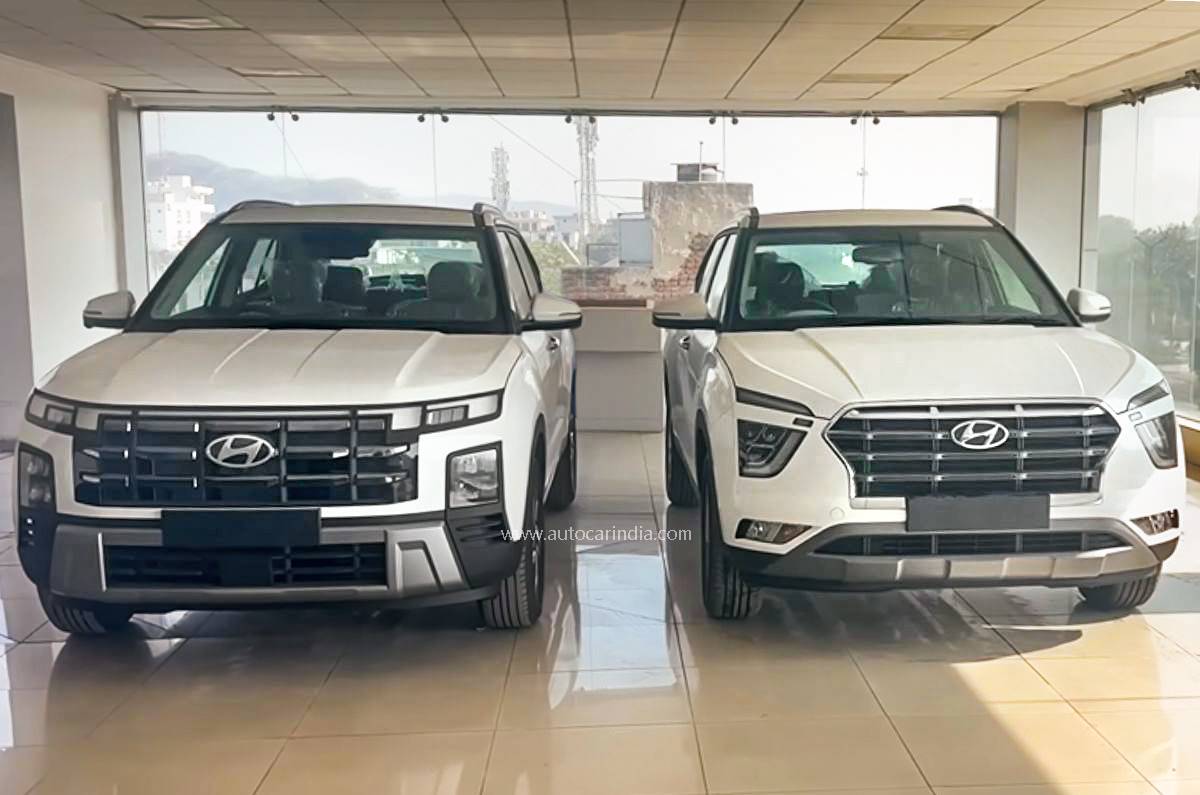
The second-generation Hyundai Creta has just received its first mid-lifecycle facelift, with extensive updates inside and out. Notably, these updates are specific to our market, which means Hyundai has really gone the distance in updating what is one of the brand’s bestselling models in India. We take a close look at all that has changed on the Creta over its predecessor.
Hyundai Creta exterior: old vs new
The front and rear of the new Creta, which is where most changes are concentrated, have almost no resemblance with the outgoing model. Incorporating Hyundai’s parametric design details, the Creta has an all-new face with a large rectangular grille with three prominent horizontal slats. These are further segmented by four vertical bars, and make for a more upright and boxier stance.

The split headlamp setup continues from before, but there’s a full-width LED light bar atop the grille. The C-shaped LED daytime running lamps outlining the headlamps have made way for new, inverted L-shaped ones that form one continuous light band edge to edge. Meanwhile, the main headlamps are now quad-LEDs (the outgoing model had tri-LEDs), and have a new squarish shape.
The lower portion of the bumper has also been completely redone – the faux silver skid plate is a lot chunkier, there’s a larger central air intake and the fog lamps have been completely done away with. One thing is for sure, the Creta now looks a lot more coherent and less polarising than the outgoing model that hugely divided opinion.

The rear has been completely redone as well. The split tail-lamp setup is gone, and instead there’s a full-width LED light bar, with the tail-lamps mimicking the front LED daytime running lamp design. The number plate housing has also been slightly revised, and the rear bumper, just as in the front, has a chunkier silver skid plate. In profile, however, there's nothing apart from the new alloy wheels that indicate that this is the 2024 model.
Hyundai Creta interior: old vs new
The interior updates are just as comprehensive as the exterior. The outgoing Creta had a very conventional design with a dashboard-incorporated touchscreen and a conventional instrument cluster. The new Creta, however, uses a connected infotainment and instrument cluster setup, which has brought about a complete redesign of the dashboard. On the inside too, the stance is a lot more upright than before.
What’s really cool is how the new AC vents have been incorporated into the dashboard design – the passenger side air vent in now neatly housed within a gloss black trim on the dashboard and is accentuated by a silver garnish. The central and driver-side air vents, meanwhile, are now a slim band underlining the screens. There’s also a new handy storage shelf on the dashboard.

Lower down, the HVAC control console retains a similar shape, but the switchgear for the dual-zone climate control is all-new. There’s a mix of rotary dials, toggle switches and buttons, which should be intuitive to use on the go, and are more than welcome compared to touch-based panels. What hasn’t changed is the steering wheel, although the steering-mounted buttons get a new gloss black finish. Hyundai has also used lighter colours for the interior of the Creta facelift.
Hyundai Creta interior: features
Typical to all Hyundais, the equipment list on the new Creta has been a major talking point. The outgoing car was already generously equipped, and Hyundai has added features like dual-zone climate control, two-step adjustable rear seat backrest, 360-degree camera and a comprehensive suite of connected car features.
But the biggest talking point has to be the camera-based ADAS suite on the higher-spec models. This includes features such as auto emergency braking, adaptive cruise control with stop and go, lane keep assist and more. The infotainment system also runs an updated software.
Hyundai Creta powertrain options: old vs new
The only major mechanical change on the Creta facelift is the new 160hp, 1.5-litre turbo-petrol engine – replacing the discontinued 140hp, 1.4-litre turbo-petrol unit – and it only comes paired with a 7-speed dual-clutch automatic gearbox. The 115hp, 1.5-litre petrol and diesel engines continue unchanged, with their respective manual and automatic gearbox options.
The Creta has remained in a league of its own in the midsize SUV segment where it rivals the Kia Seltos, Maruti Grand Vitara, Honda Elevate, Volkswagen Taigun and MG Astor, among others. The facelifted model sees a reasonable bump in price with all its new additions, but it's likely to continue to dominate the sales charts.
Also See:
2024 Hyundai Creta facelift walkaround video



